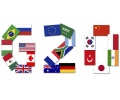
There are many good economic reasons why President Donald Trump is wrong to obsess over the U.S. trade deficit with China. One is that this bilateral deficit isn’t as severe as he thinks — and, in any case, the structural factors that caused the imbalance in the first place are changing. Before launching a U.S.-China trade war, the White House needs a more accurate picture of how the world, in fact, trades.
America’s goods deficit with China indeed hit a record level last year — around $375 billion. But, that’s arguably a data point from another era. The rise of global value chains in the 1990s and 2000s has fundamentally recast the landscape of world trade. Gone are the days when cargo ships primarily carried finished goods from one country to another. Instead, vast streams of manufacturing components now crisscross borders to feed globally diverse and fragmented production networks.
Simply measuring gross exports and imports, which the trade deficit does, fails to capture this new reality. Take mobile phones. Inside any “Made in China” phone, you’ll find all manner of processors, circuits and parts from South Korea, Taiwan, Japan and elsewhere — even the U.S. Yet, according to official trade statistics, the entire value of the phone counts as an import from China.
New data can be used to map how these global value chains are structured and thus to assess bilateral trade relationships more accurately. One such data set comes from the University of Groningen’s World Input Output Database (WIOD), which can be used to calculate a metric called “value-added trade.” Value-added exports and imports isolate the actual economic value produced in one country and consumed in another, stripping out the value of foreign-made components.
Using this data, we calculate that the U.S. trade deficit in goods and services with China in value-added trade terms in 2014 (the most recent year for which WIOD data sets are available) was $200 billion. This compares to the official estimate of $315 billion. Meanwhile, U.S. value-added imports from China were worth $320 billion that year, not $483 billion as the official statistics would lead one to believe. (U.S. value-added exports to China totaled $121 billion, not $167 billion.) This recalculation captures both goods and services exchanged directly between the U.S. and China, as well as indirect trade, or goods and services exchanged via intermediary countries.
Not only is the deficit less severe than commonly thought, but U.S. trade balances with nations that supply China with components are distorted. Factories in Korea that produce memory chips for Chinese-assembled mobile phones, for example, benefit from U.S. demand for these phones. These chips constitute indirect Korean exports to the U.S. that don’t show up in traditional U.S.-Korean trade data.
Adding to this increasingly complicated picture, a significant volume of our imports from China emanate from U.S. manufacturers producing there. Blunt, China-focused tariffs won’t consider these nuances; the casualties will include U.S. companies and their suppliers and resellers, many of them in the U.S.
It’s also important to recognize that the real trade deficit with China may be plateauing. This is because the structural factors that drove U.S. manufacturing to China in the late 1990s and early 2000s — low labor and other production costs — are diminishing. Production costs in China are rising markedly and outpacing productivity growth there, which means that Chinese competitiveness in manufacturing is on the decline.
At the same time, the digitalized goods of the future will likely be manufactured closer to home. When it comes to highly technical export categories — such as smart, interconnected devices and new-energy vehicles — localized technology requirements and the benefits of market proximity should encourage considerable “reshoring.” Those structural drivers help explain Foxconn Co. Ltd.’s major investment in an intelligent, flat-screen TV production facility in Wisconsin, for instance. They also explain why China is pouring so much money into advanced manufacturing industries, through its “Made in China 2025” plan.
The Trump administration should be focused on the mercantilist features of Chinese trade policy, rather than the decreasingly relevant transactional inequities of the past. Instead of raising barriers to “Chinese” imports, the U.S. should be pressing China to open up its own markets wider, to allow greater investment access and a level playing field for U.S. firms vis-à-vis local players.
The U.S. has leverage to press these demands, given China’s obsession with economic stability at this critical juncture. The aforementioned value-added trade data also tell us that only 0.7 percent of U.S. GDP depends on Chinese consumption of American-made goods and services, while 3.1 percent of China’s GDP is derived from U.S. demand. So, in any tariff battle, China would likely suffer more.
That said, the earnings, employment, investment and shareholder value of U.S. firms dependent on China would undoubtedly be hurt badly by Chinese retaliation. The Trump administration should be cautious about launching a trade war that’s aimed at the wrong problem — and will only create new ones.
Source: Bloomberg






